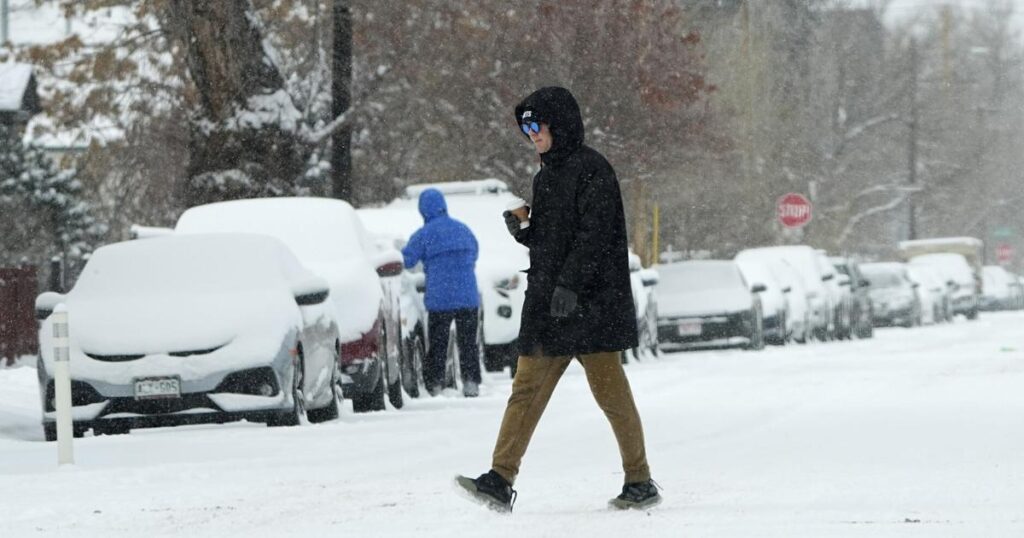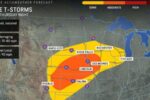As millions of Americans brace for a brutal winter storm sweeping across the country, heating bills are expected to climb to unprecedented levels, putting additional financial strain on households already struggling with inflation and high living costs. The winter storm, which has been making its way across the Midwest and Northeast, is expected to bring freezing temperatures, heavy snow, and ice, leaving many people reliant on their heating systems to stay warm. For many families, this sudden increase in energy consumption could mean a significant spike in heating costs, just as many are already dealing with the financial burdens of everyday life.
Unprecedented Cold Expected to Impact Millions
The winter storm, which began making its way across the United States in early February, has affected millions of people across several states. From the plains of the Midwest to the busy streets of the Northeast, residents have been warned to prepare for extreme cold and heavy snowfall. Cities such as Chicago, New York City, and Boston have already experienced record-low temperatures, and meteorologists predict that the worst is yet to come.
In many regions, temperatures have plunged to below freezing, with wind chills making it feel even colder. The bitter cold is expected to last for several days, and experts predict that these freezing temperatures could lead to a sharp increase in energy demand as households try to keep their homes warm.
Rising Heating Bills
One of the immediate consequences of the winter storm is a sharp increase in heating bills. As temperatures drop, people turn up their thermostats, and this sudden spike in demand for heating can strain both residential heating systems and energy suppliers. The colder the weather, the more energy it takes to maintain a comfortable indoor temperature, which leads to a higher overall energy consumption.
For homeowners who rely on natural gas, propane, or heating oil to warm their homes, this is a particularly challenging time. Many of these energy sources are subject to fluctuating prices, and with increased demand during the winter months, prices can soar. The U.S. Energy Information Administration (EIA) has already warned that many households can expect their heating bills to increase by 15% to 30% compared to last year.
This increase in heating bills is especially concerning for low-income families and seniors on fixed incomes, who often find it difficult to keep up with the rising costs of energy. The U.S. has already seen inflation impacting groceries, healthcare, and housing, and now the added burden of rising energy costs is putting additional strain on household budgets.
Energy Prices Surge Due to Increased Demand
The primary reason for the surge in heating bills is the increased demand for energy. When temperatures plummet, the demand for heating rises significantly. This increased demand pushes up energy prices, as suppliers are required to meet the heightened need. This has been exacerbated by a variety of factors, including global supply chain disruptions, labor shortages, and geopolitical tensions.
Natural gas prices, in particular, have seen sharp increases over the past year, driven in part by supply chain issues and a tight global energy market. While domestic production of natural gas has improved, global demand for energy remains high, especially in countries like Europe and China. As a result, the U.S. has seen natural gas prices spike, and this has translated into higher heating costs for consumers.
Propane and heating oil prices have also risen, with some households facing significant increases in their fuel bills. These increases are putting added pressure on people who rely on these fuels for heating during the winter months.
Impact on Low-Income Families
For low-income families, the financial burden of rising heating costs can be overwhelming. Many of these households already struggle to make ends meet, and the prospect of higher heating bills could leave them choosing between staying warm and putting food on the table.
The federal government has a program called the Low Income Energy Assistance Program (LIHEAP), which provides assistance to eligible low-income households to help cover the cost of heating during the winter months. However, with demand for assistance expected to rise, many households may not receive the help they need, leaving them at risk of utility shutoffs and dangerously cold living conditions.
Seniors are particularly vulnerable during extreme winter weather, as they are often more sensitive to temperature changes. With many seniors on fixed incomes, the rise in heating costs can have a significant impact on their ability to pay for other necessities, such as medication and groceries. Social services agencies are reporting an increase in calls from seniors seeking assistance with heating bills, and many organizations are working to ensure that vulnerable populations stay safe during the storm.
Energy Conservation Tips to Lower Heating Costs
As heating bills continue to climb, there are several energy conservation tips that can help households reduce their heating costs. Here are some simple steps that can make a big difference:
- Lower the Thermostat: Even a small reduction in thermostat settings can lead to significant savings. Experts recommend setting the thermostat to 68°F during the day and lowering it at night or when you are away from home.
- Seal Drafts: Cold air can enter the home through gaps around windows and doors. Sealing these drafts with weatherstripping or using draft stoppers can help retain heat and prevent energy loss.
- Use Space Heaters: If only one or two rooms need to be heated, consider using a space heater instead of turning up the thermostat for the entire house. Just be sure to follow safety guidelines and never leave a space heater unattended.
- Insulate the Home: Proper insulation helps maintain indoor temperatures and reduce the need for excessive heating. Check for gaps in insulation around the attic, basement, and walls, and consider adding additional insulation if necessary.
- Maintain the Heating System: Make sure that your heating system is in good working order by changing air filters regularly and scheduling annual maintenance. A well-maintained system operates more efficiently and uses less energy.
- Utilize Sunlight: During the day, open curtains and blinds to let in natural sunlight. This can help warm up the home without having to rely on the heating system.
The Bigger Picture: The Future of Energy Prices
While this winter storm has brought an immediate surge in heating costs, it is part of a broader trend of rising energy prices that has been impacting consumers for the past year. The rising costs of natural gas, heating oil, and propane are expected to continue to affect households, particularly in colder regions. As climate change continues to impact global weather patterns and energy supply chains, it’s likely that energy prices will remain volatile for the foreseeable future.
The U.S. government has already started to explore ways to address these rising costs, with some lawmakers calling for increased funding for energy assistance programs and others urging investment in renewable energy sources to reduce reliance on fossil fuels. As energy prices continue to climb, finding sustainable and affordable energy solutions will be essential to protecting households from future price hikes.
Conclusion
As millions of Americans endure the bitter cold of this winter storm, heating bills are set to climb to new heights. With energy prices surging and demand for heating increasing, many families will face financial hardship as they try to keep their homes warm. Low-income households, seniors, and those with limited resources are especially vulnerable to the rising costs. However, by adopting energy conservation strategies and seeking assistance programs, individuals can reduce their heating costs and stay safe during the winter months.
The current storm serves as a reminder of the broader challenges facing the nation in terms of energy security, and it underscores the importance of finding solutions to ensure that all Americans have access to affordable, reliable energy.
Disclaimer – Our editorial team has thoroughly fact-checked this article to ensure its accuracy and eliminate any potential misinformation. We are dedicated to upholding the highest standards of integrity in our content.





More Stories
Heating Bills Set to Climb as Millions Endure Bitter Cold from Winter Storm
Heating Bills Set to Climb as Millions Endure Bitter Cold from Winter Storm
Heating Bills Set to Climb as Millions Endure Bitter Cold from Winter Storm